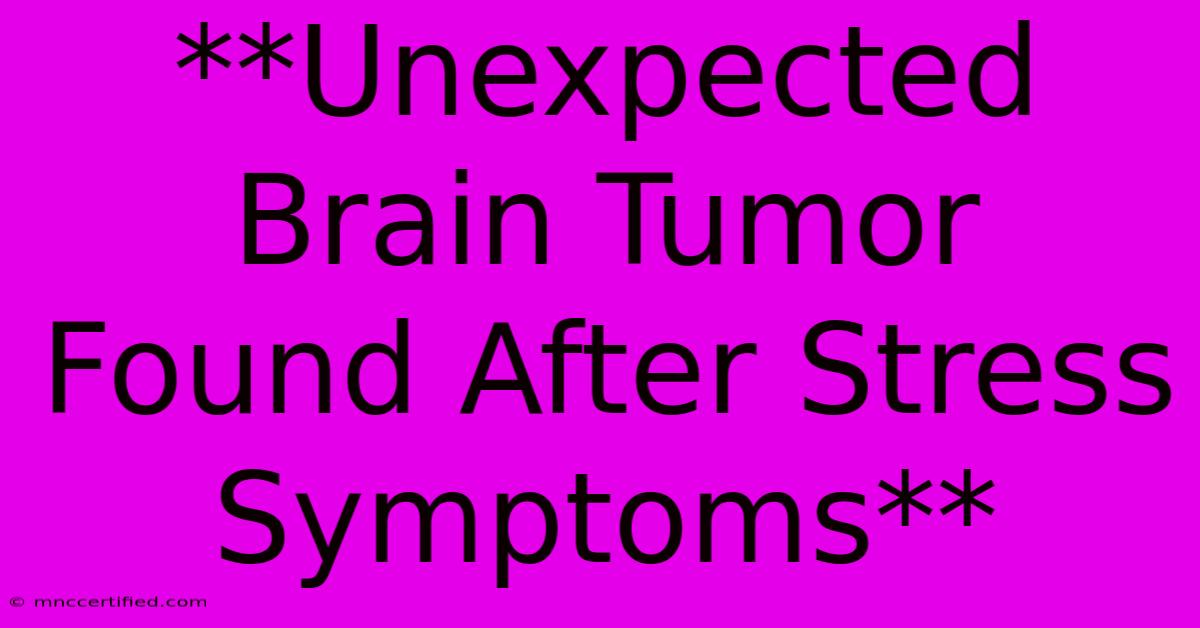**Unexpected Brain Tumor Found After Stress Symptoms**

Table of Contents
Unexpected Brain Tumor Found After Stress Symptoms: A Wake-Up Call
Stress is a common part of life, but for some, persistent symptoms can signal a serious underlying issue. One such issue is a brain tumor. While not every instance of stress or anxiety points to a tumor, it's crucial to be aware of the potential connection and seek medical attention if your symptoms are severe or persistent.
Stress and Brain Tumors: Understanding the Link
The brain is a complex organ, and stress can have a profound impact on its functioning. While stress itself doesn't cause brain tumors, it can mimic some of the symptoms, making it difficult to differentiate between the two.
Here's why:
- Stress-induced headaches: These are common and often go away with rest and relaxation. However, persistent or worsening headaches, especially accompanied by other symptoms, could indicate a tumor.
- Cognitive decline: Stress can lead to forgetfulness and difficulty concentrating, but these symptoms can also be associated with a brain tumor, particularly if they significantly impact daily life.
- Emotional changes: Mood swings, anxiety, and depression are often linked to stress. However, these changes can also be caused by a tumor affecting the brain's emotional centers.
- Seizures: These are rare but can occur in both stress and brain tumor cases. Unprovoked seizures, especially those accompanied by other symptoms, require urgent medical attention.
Recognizing When to Seek Medical Advice
It's important to differentiate between stress-related symptoms and those potentially caused by a brain tumor. Here are some key indicators to watch for:
- Sudden onset: New, severe, or rapidly worsening symptoms are often a red flag, especially when not related to an obvious trigger.
- Persistent symptoms: If your stress-related symptoms don't improve with time or persist despite efforts to manage stress, it's essential to see a doctor.
- Cluster of symptoms: Multiple symptoms occurring together, especially those unrelated to stress, should prompt a medical evaluation.
- Neurological changes: Numbness, tingling, weakness, vision problems, or difficulty speaking can all indicate a potential issue in the brain and require immediate attention.
What Happens When a Brain Tumor is Suspected?
If your doctor suspects a brain tumor, they will order a series of tests to confirm or rule out the diagnosis. This may include:
- MRI: A magnetic resonance imaging scan provides detailed images of the brain, allowing doctors to identify any abnormalities.
- CT scan: A computed tomography scan uses X-rays to create detailed images of the brain.
- Biopsy: If a tumor is identified, a biopsy may be performed to determine its type and whether it's cancerous.
Living with a Brain Tumor: A Personalized Approach
If a brain tumor is diagnosed, your treatment plan will depend on the tumor's type, size, location, and your overall health. Treatment options can include:
- Surgery: Removing the tumor surgically is often the first line of treatment.
- Radiation therapy: This targets the tumor cells with high-energy rays to destroy them.
- Chemotherapy: Medication is used to kill cancer cells or prevent them from growing.
- Targeted therapy: Medications specifically target the tumor cells while minimizing damage to healthy cells.
Importance of Early Detection and Support
Early detection of a brain tumor is crucial for improving treatment outcomes. If you experience any persistent symptoms or concerns, don't hesitate to seek medical advice. There are many resources and support systems available to help you navigate this journey.
Remember, while stress can have a significant impact on our well-being, it's important to be aware of the possibility of underlying medical conditions. By recognizing the potential link between stress and brain tumors and seeking timely medical attention, you can ensure your health and well-being.

Thank you for visiting our website wich cover about **Unexpected Brain Tumor Found After Stress Symptoms**. We hope the information provided has been useful to you. Feel free to contact us if you have any questions or need further assistance. See you next time and dont miss to bookmark.
Featured Posts
-
Bronny James G League Debut Sells Out
Nov 09, 2024
-
Georgina Cooper 90s Supermodel Dead At 46
Nov 09, 2024
-
Farm And Home Mutual Insurance Company
Nov 09, 2024
-
Wilmington Collective Investment Trust
Nov 09, 2024
-
Gladiator Ii Paul Mescal Stars In Ridley Scott Sequel
Nov 09, 2024